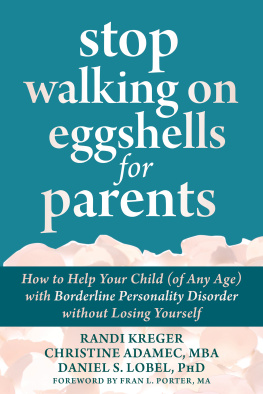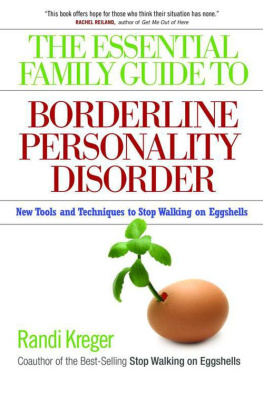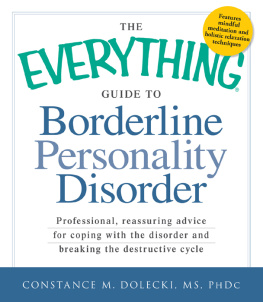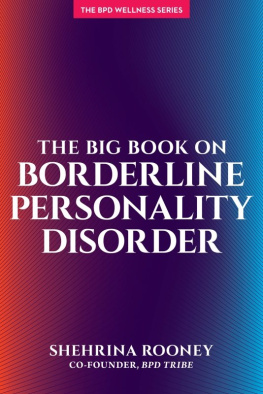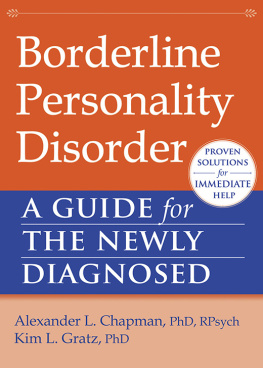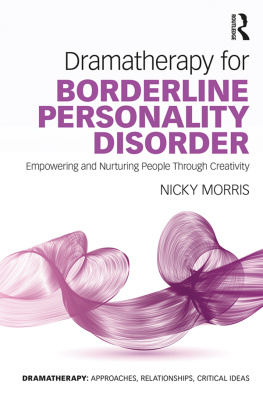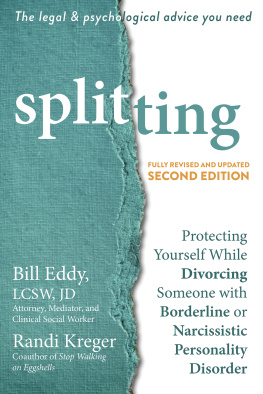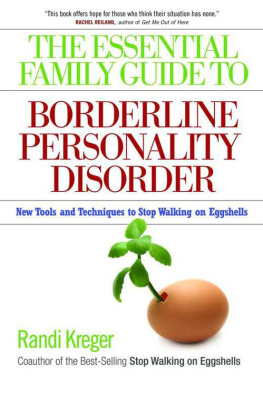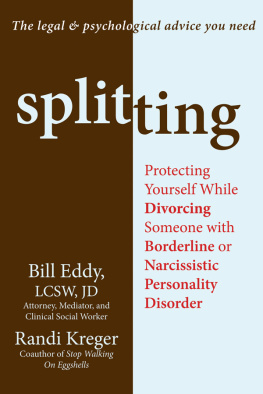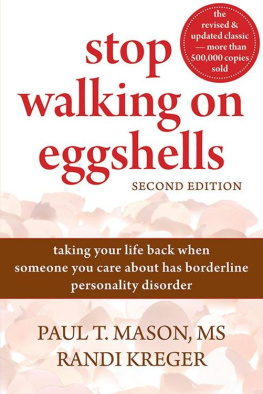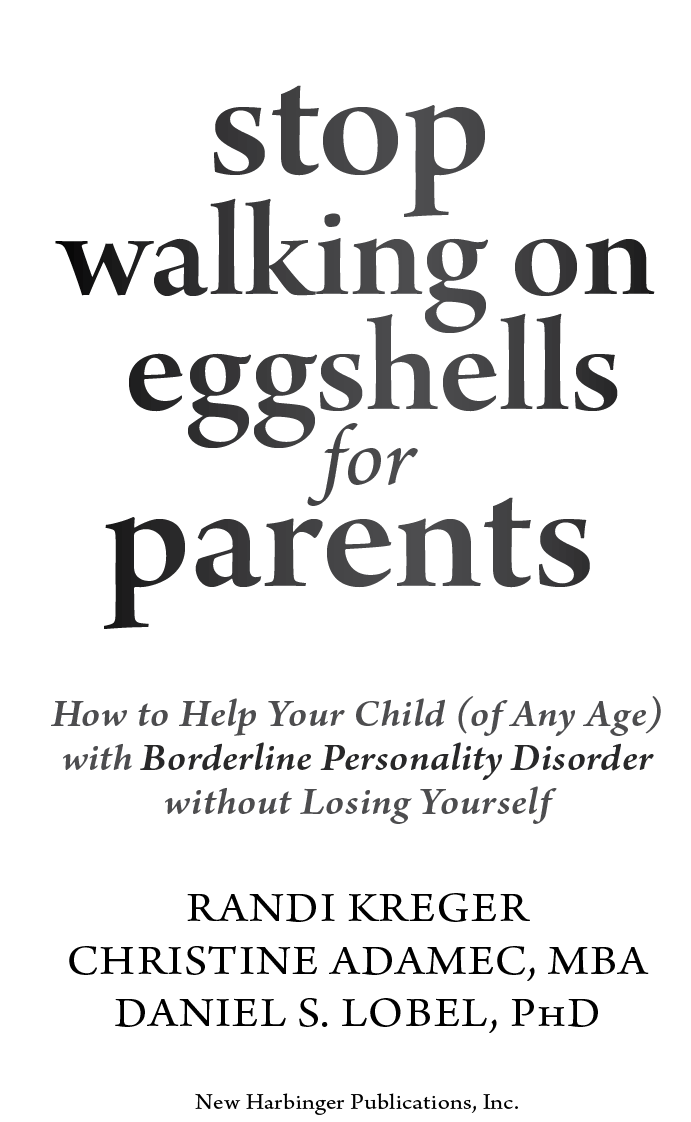Children dont come with instruction manualsparticularly borderline personality disorder (BPD) children. This book is a comprehensive guide to why your child is so troubled, disrespectful, and prone to rages; how you can strategize to improve these and other typical BPD behaviors (and your own health in the process!); and where to find the resources to assist you. For bewildered and beleaguered parents at their wits end, its the answer to a prayer!
Fran L. Porter, BEd, MA, 2017 Calgary Philanthropic Award winner, and author of When the Ship Has No Stabilizers
This book is full of useful information for parents and caretakers of children with BPD. It is a great resource for those who need help with the behavior and ever-changing emotions of their child. I highly recommend this book to parents of children at any age to help navigate the uncertain journey with BPD, and help themselves and their child.
Donna Toone, administrator of the Facebook group, Support for Parents of Children with BPD; and mom of a child with BPD
Stop Walking on Eggshells for Parents is a much-needed and welcome guide for families who have a child with borderline behaviors. Using research and interviews with real families, the authors provide comprehensive guidance, information, support, parenting suggestions, treatment options, and extensive examples to help parents respond effectively to the difficult challenges of their emotionally dysregulated children. It fills a great need for practical, understanding support.
Margalis Fjelstad, PhD, author of Healing from a Narcissistic Relationship, and coauthor of Raising Resilient Children with a Borderline or Narcissist Parent
Stop Walking on Eggshells for Parents takes on the challenging territory of helping parents who have a child living with BPD, and provides actionable suggestions in a framework that is compassionate toward everyone in the family system. Very few books take on the issue of the onset of BPD patterns in childhood and adolescence, and this awareness is essential to helping families with support instead of stigma.
Ramani Durvasula, PhD, clinical psychologist; founder and CEO of LUNA Education, Training and Consulting; and retired professor of psychology at California State University, Los Angeles
Publishers Note
Care has been taken to confirm the accuracy of the information presented and to describe generally accepted practices. However, the authors, editors, and publisher are not responsible for errors or omissions or for any consequences from application of the information in this book and make no warranty, express or implied, with respect to the contents of the publication.
Distributed in Canada by Raincoast Books
NEW HARBINGER PUBLICATIONS is a registered trademark of New Harbinger Publications, Inc.
New Harbinger Publications is an employee-owned company.
Copyright 2022 by Randi Kreger, Christine Adamec, and Daniel Lobel New Harbinger Publications, Inc. 5674 Shattuck Avenue Oakland, CA 94609 www.newharbinger.com
All Rights Reserved
Acquired by Catharine Meyers
Cover design by Amy Shoup
Library of Congress Cataloging-in-Publication Data
Names: Kreger, Randi, author. | Adamec, Christine A., 1949- author. | Lobel, Daniel S., author.
Title: Stop walking on eggshells for parents : how to help your child (of any age) with borderline personality disorder without losing yourself / Randi Kreger, Christine Adamec, and Daniel S. Lobel.
Description: Oakland, CA : New Harbinger Publications, 2022. | Includes bibliographical references.
Identifiers: LCCN 2021046291 | ISBN 9781684038510 (trade paperback)
Subjects: LCSH: Child rearing--Popular works. | Borderline personality disorder in children--Popular works. | Self-care, Health.
Classification: LCC HQ769 .K6844 2022 | DDC 649/.1--dc23/eng/20211109
LC record available at https://lccn.loc.gov/2021046291
Ive never met a strong person with an easy past.
Unknown
I dedicate this book to all the parents struggling with children who have borderline personality disorder (BPD), especially those who allowed us to interview them for the book: the mothers of the Facebook group Parents of Children with BPD, my own group Moving Forward, and those who responded to a detailed survey. You are all heroes.
Randi Kreger
Contents
Foreword
When Randi Kreger asked me to write a foreword for this book, I responded without hesitation that Id be delighted. I had not yet read the manuscript, but I had read her book Stop Walking on Eggshells and her two other BPD books while researching When the Ship Has No Stabilizers , my memoir about Colleen, my daughter with borderline personality disorder. I knew that, like those books, this one would be a fount of information to help parents of children with this disorder. How my husband and I could have used such information during Colleens formative years between 1980 and 1996, before she turned eighteen!
Colleen was born in 1978. At that time, there was not the body of knowledge or writing on her condition that exists today. From age two, she showed behavior extremes such as excessive clinginess at times, pushing us forcefully away at other times, and throwing frighteningly intense temper tantrums over seemingly minor issues. Repeatedly we were told, Shell grow out of it. She didnt. Like any illness that goes untreated, it got worse and worse. She would pound her fists, throw things, and swear at us. When we wouldnt instantly gratify any demand she might make, she would call us names and tell us how much she hated us. Puberty brought smoking, risky sexual activity, hanging out with the drug crowd, ignoring curfews, and becoming addicted to drugs herself.
Yet, despite all this, we were given what I would call the brushoff by genuinely caring experts. With the best of intentions, they dismissed us as overly worried parents. Colleen was extremely bright. Id venture to say she had the highest IQ in our family. The psychologists and psychiatrists who saw her all commented on her intelligence, her facility with language, and her ability to solve almost instantly any puzzle that was put in front of her.
But, as Randi points out, feelings have no IQ. No amount of reason or logic could quell the extreme emotions that so frequently swamped our daughter. Take her away, one doctor joked, and bring me a child with a real problem. Today, after reading this book (and after having read many others written by experts), Id call that an invalidating response to Colleens cries for help.
To be fair, though, that is a revisionist statement on my part. Societys awareness of mental health issues at that time was not nearly what it is today. That doctor thought he was speaking the truth. And I, a high school teacher with a masters degree who considered herself fairly knowledgeable in certain areas, can say unequivocally that I had no knowledge whatsoever of borderline personality disorder.
The first time I even heard the term was when Colleen was fifteen and had been sentenced by a court judge to ten sessions with a qualified psychotherapist. Shed been forging our names on checks and withdrawing money from our bank accounts in order to buy drugs. With the sexual and drug history she already had, she, like so many others with BPD, had been categorized as a bad kid. And, on the recommendation of a support group counselor we were then seeing, we pressed charges. The only positive result that came from that experience was learning the name of her diagnosisexcept, maybe, for reinforcing to Colleen our firm belief that such actions should have consequences.

